Interracial Adoption Destroys a Family
Anastasia Katz, American Renaissance, November 10, 2023
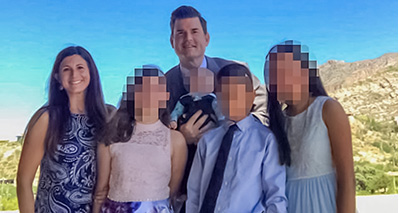
Subscribe to future audio versions of AmRen articles here.
On October 3, a trial began in Florida. Tim Ferriter, a white man, was charged with aggravated child abuse, false imprisonment, and neglect of a child. His wife, Tracy, also white, sat just behind him throughout the trial. She was also charged, but the couple’s trials were severed and a date for hers has not been set.
When I cover trials for American Renaissance, race plays an obvious role: race-hustling activists and protesters screaming outside the courtroom, and sometimes inside. The media report the race of each juror.
With Florida vs. Ferriter, race was hidden. This was a case of an interracial adoption that went horribly wrong and destroyed a family. Mr. Ferriter turned down a plea deal for two years in prison, plus five years of probation. He chose to go to trial, although that meant he could be sentenced to 40 years, if convicted.
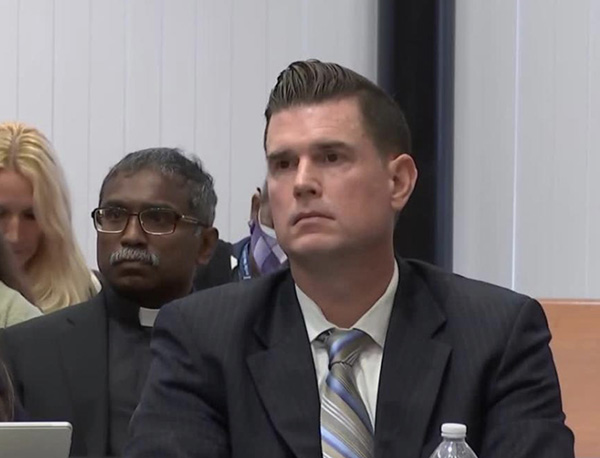
Tim Ferriter
The Ferriters have four children, two adopted and two of their own. The oldest is a girl, adopted from China. The next oldest is a boy, adopted from Vietnam. He is the only child Mr. Ferriter was accused of abusing. Since he is a minor, I refer to him only by initials, “RF.” His face was hidden when this trial was televised. The Ferriters’ two youngest children, a girl and a boy, are biological.
In January 2022, the family was living in Jupiter, Florida, to which they had returned after living in Tucson, Arizona, for five years. On January 28, RF, age 14, ran away from home. His mother, Tracy Ferriter, called the police. They searched local parks and a church but couldn’t find him. A female police officer called Tracy the next day to ask if the child had come home, but he had not. The officer testified in court that Tracy “did not seem very concerned,” because RF “had run away before.”
Two days later, on January 30, the officer called Tracy again. Tracy told the officer that RF was still missing. The police went to the Ferriter home and saw that RF had an unusual bedroom. It was an 8-foot by 8-foot windowless “box” in the garage, with a door that locked from the outside. Inside, there was a mattress and box spring, a desk, and a bucket. The room had an air conditioning unit. A Ring security camera was in a corner of the room, near the ceiling.
RF showed up at school on Monday, January 31, and the police went to get him. He told the police that he ran away because his parents kept him locked in the small room in the garage for much of the day. Officers served a search warrant on the Ring Corporation and got video of the conditions the boy had been living under for the past 23 days. Both Tim and Tracy Ferriter were arrested, and the judge set their bond at $50,000 each. Both bonded out a few hours later, and their children were put into foster care.
In the trial that took place a couple of weeks ago, the state accused Mr. Ferriter of being a monster who cruelly tortured his adopted son. He claimed that he acted out of desperation, unable to handle a troubled and sometimes violent young teenager diagnosed with Reactive Attachment Disorder.
The state’s case
Prosecutors Brianna Coakley and Karen Black led the jurors through RF’s life. He had been abandoned at an orphanage in Vietnam, where he was not cared for properly. Tim and Tracy Ferriter adopted him in 2009, when he was one and a half years old. RF was a troubled child who did not respond to discipline, so they became more and more restrictive as he got older.
I will call the oldest Ferriter child, adopted from China, “FF” because she is under 18. She is two years older than RF. She told the jury about the years the family lived in Tucson. At first, before the youngest child was born, each of the three children had his own room. RF was not confined at first, but later, his parents put a latch on the outside of his door, so they could shut him in. After their youngest child was born, Mr. and Mrs. Ferriter built a room for RF in the garage. This room had no windows and it locked from the outside. FF said the room smelled bad because her brother “peed in there.” RF’s bedroom was in the garage for two years before the family moved back to Florida, where they built another garage room.

Ferriter home in Jupiter, Florida.
The older sister testified that RF always seemed to be in trouble. She saw her father grab him and drag him into the garage room. She heard her father yell at him, and she heard hitting noises. She said she feared her father would accidentally kill her brother. “At the time, I didn’t have a name for what was happening to him,” FF said, “But I do now: abuse.”
Mr. Ferriter’s defense lawyer claimed in opening statements that RF was locked in his room to protect the other children, but FF testified that she never felt afraid of RF, that he never harmed or threatened her, except for one time when he stole something from her. She never saw him hurt the younger children.
FF said RF was treated very differently from the other children. Her parents wouldn’t let him have the sugary snacks the other kids ate. When they moved to Florida, RF had to do yard work that she did not have to do, and RF was locked out of the house until his work was finished. RF received more severe punishments than she did, and she was never locked in her room. The older sister said she rarely ate meals with RF because he ate in his room. Sometimes everyone in the family went somewhere together, for example, to hear her band perform. RF stayed home, locked in his room. She noticed that RF was becoming more withdrawn and smiled less.
FF told the jury that her brother ran away once, and when he came home, their parents locked him out for a while. They did not let her open the door to let him back in.
Prosecutor Brianna Coakley examined RF himself in court. He is a well-spoken young man in 10th grade, and his favorite subjects are AP Calculus and AP Chemistry.
He told Miss Coakley he was not nervous about testifying, but he doesn’t like to talk about what happened. Asked if he felt relieved to be testifying, RF answered, “I don’t have any feelings about it.”
RF said he was in 8th grade when the family moved to Florida. Each of the other children had his own room in the new house, but RF’s bedroom was an 8-foot by 8-foot room in the garage. He knew that his father hired a contractor to build the room, explaining, “I was kept in the closet and I overheard their conversation of having to build it.”
The teenager testified that the floor was concrete, with some mats on it, “so it wasn’t so hard.” His bed was a mattress on the floor. The room had no windows. There was an air conditioner that his parents controlled; he was not allowed to turn it on or off by himself. The room had a light, but the switch was outside the room, so he could not turn it on or off. He said he was sometimes locked in the room during the day “for a couple of hours” with the light off. RF said when the light was off, the room was “pitch black” and he had to feel his way around.
The door had a lock and a deadbolt on the outside. RF said that most of the time he was inside the room, he was locked in. His parents installed a Ring camera so they could watch him and talk to him from other parts of the house.
If he needed to use the bathroom when he was locked in the room, he used a bucket. In Florida, he used the bucket only to urinate, but when he lived in a similar room in Arizona, he used a bucket to defecate also. RF said the room smelled “putrid” after he used the bucket.
Sometimes he was locked in with nothing to drink. “I received water occasionally, but not on a regular basis.” He ate most of his meals in the room. If he got hungry while locked in, he had no way to get food. He explained that “to me, being locked in a room, it’s dehumanizing. It’s almost as bad as genocide.” He said that if he refused to go in, “I was put in the room by physical force.”
He said he made escape plans several times, but they failed. On January 28, he was able to escape because his younger brother opened the door.
RF testified that on school days, Mr. or Mrs. Ferriter woke him at 6:30 or 7 am. He went outside and emptied the bucket in a way so that the neighbors would not see. He got dressed for school, but his clothes were kept outside his room. He said he got breakfast only about half the time. Breakfast was always peanut butter on bread and a banana. Sometimes he ate outside the house and sometimes he ate in his room. He left for middle school at 9 am.
RF brought lunch to school; he wasn’t allowed to buy lunch or any of the snacks for sale at school. His parents gave him a peanut butter sandwich, chips, and fruit for lunch.
He got home from school at 3:30 and his parents locked him back in the room, where he stayed until dinnertime. Sometimes he ate with the family, but most of the time, he ate in his room. His parents let him out at 9 pm or 10 pm to go to the bathroom, and then RF was locked in for the night.
Miss Coakley asked him what he had in the room. “I had my small selection of toys and just books,” RF answered, saying that his parents took his toys away and then took his books away until he was down to only a few textbooks. He was not allowed any electronics in the room, except for the school laptop he used for homework, but he did not have this all the time. RF heard others at school talking about playing games on the school laptop, but he was never allowed to.
RF testified that there were times when he was let inside the house to do chores. He sometimes played outside with his siblings, but most of his outdoor time was spent doing chores, such as raking leaves. He said there was a Ring camera facing the backyard, so his parents could watch him. He was not allowed back inside until his work was finished; he could not go inside to get a drink or cool off.
Because the charges against Mr. Ferriter were brought by the state of Florida, Miss Coakley told the jury they should make their decision based on the events that occurred in Florida, but she asked RF about his life in Arizona, too. RF’s first room in Arizona was inside the house. It had a window, a desk, a dresser, and a normal bed. He also had a coffee table that he played chess on. At some point, his parents put a lock on the outside of the door, and began to lock him in. There was no adjoining bathroom.
RF said he was put in the garage room at age 11, when he was in fifth grade. The garage room in Arizona had a bed with a box spring and frame, a desk, and a wall-mounted air conditioner, which he was not allowed to touch. He also had a bucket. He estimated that the longest he was locked in the room in Arizona was about 18 hours. He never knew how often he would be fed. “Sometimes I got all three meals, sometimes I got one, sometimes I got two.”
RF said that after they moved back to Florida, his father pushed and grabbed him, but things were worse when they lived in Arizona: “I was smacked in the face. He would grab me by the neck. He would grab my arm.” His father spanked him with a jump rope or a belt, and “there would be a lot of yelling.” If his sisters did something wrong, “they would get their phones taken away for a day or two.”
Defense attorney Prya Murad cross-examined RF. He said that he did not bear a grudge. He said, “I don’t have a bad image of Tim and Tracy [Ferriter]. They just made a mistake. They were just acting out of frantic surprise at my actions. I believe that they weren’t trying to do any harm. I believe that people should recognize that that was a mistake and forgive them and move on.”

Pyra Murad
RF gave the jury a different view of the Ferriter family under cross-examination. Mr. Ferriter often traveled abroad for work. Mrs. Ferriter was a busy working mom who spent a lot of time taking children to extracurricular activities. She brought RF’s big sister to softball, concert band, and marching band practices. RF was in a chess club and on the track team. RF had started out with a bedroom that had all the furniture and toys you would expect to see in a child’s room, and he came and went freely.
Sometime after Mr. and Mrs. Ferriter’s youngest child was born, RF was moved to a room in the garage in the Arizona house. At first, the room had a dresser, but his parents took it away after he ripped up his clothing and because he hid electronics in it. Asked why he was not allowed to have electronics, RF said, “I did go into a bunch of school’s things [electronics] and do some not-so-legal stuff.” He hacked the school’s IT system and jailbroke his school laptop, meaning he did such things as remove the restricted mode of operation.
When the prosecution showed the jury photos of the room in the Florida garage, the walls were bare. On cross examination, RF testified that he originally had posters on his walls, but he got angry and tore them up. He admitted to having outbursts, but said, “I would not cause physical harm to myself or others.”
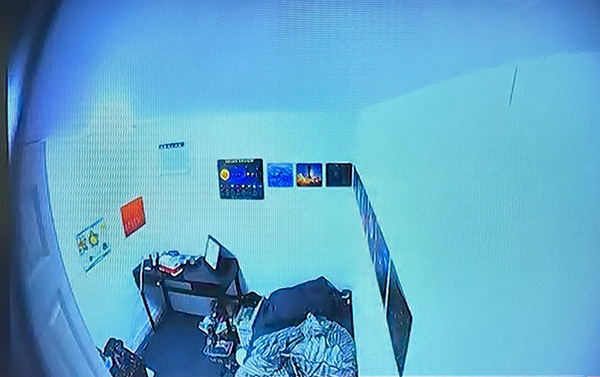
However, he later admitted that he injured his little brother’s face, and gave his four-year-old brother beer to see how he would react. He admitted that he brought a box cutter to school, and had been in trouble several times for stealing. He admitted that when he got angry, he threw and kicked things. He also said he intentionally broke his parent’s rules, several times a week.
The state called an expert witness, Dr. Wade Myers, a professor of psychiatry at Brown University. Dr. Myers said Mr. Ferriter’s treatment of his adopted son was “malicious,” “cruel” and “sadistic,” that they kept the boy in “solitary confinement,” which has “detrimental psychological impacts” on children and is not recommended even for children in juvenile detention. He added that children in detention have regular meals, access to bathrooms, a sink with water, and people they can call to for help. He said locking RF up was “torture.”
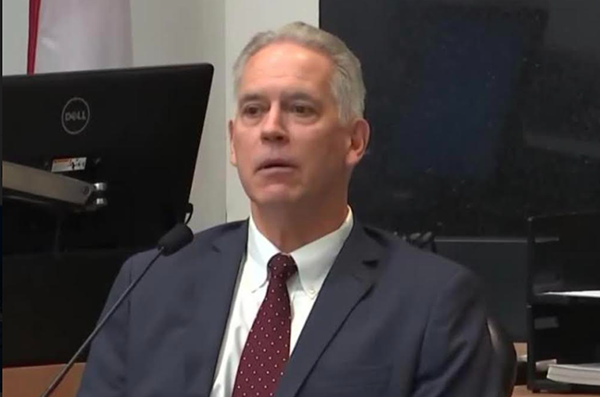
Dr. Wade Myers
Dr. Myers said that children who suffer from intellectual and cognitive deprivation retreat into fantasy life. They may form a bond even with an abusive parent and think they are the cause of the problem.
In opening arguments, Tim Ferriter’s defense said that putting RF in the garage room was a desperate attempt to deal with his behavior. The Ferriters had taken RF to a psychologist who diagnosed the boy with Reactive Attachment Disorder (RAD), a condition caused by neglect and malnourishment in infancy and early childhood. Such children cannot bond with adults, and they may have trouble with relationships all their lives. They tend to be angry and sad, but don’t want to be touched, and refuse to be comforted. They don’t feel guilt or remorse.
Dr. Myers told the jury that Mr. Ferriter’s actions were the wrong way to treat a child with RAD, and only made things worse.
The state showed the jury videos from the Ring cameras, which corroborated RF’s testimony. To protect his identity, the videos were not shown on television, and the audio was sometimes unintelligible. There was footage of:
- RF screaming, talking to himself, and crying.
- RF laying mulch in the yard while his parents sat and watched.
- Ferriter lecturing his son in a calm voice.
- Ferriter scolding RF for stealing candy, lying, and “having a bad attitude.”
- Ferriter throwing RF onto a bed and putting his hands on the boy’s neck, before turning off the light and leaving RF alone in the dark.
- Ferriter coming in to wake his son after 10 hours overnight and saying to RF, “Take out your bucket. Your neighbors don’t need to see your piss bucket.”
- A 12-minute exchange you can listen to here. It’s a long rant, in which Mr. Ferriter loses his temper, breaks something in the room to prove his point, and uses foul language. Mr. Ferriter notices a pretzel on his son’s bed; he tells him to eat it right away. “You want rats in here, too?!” He suggests that sometimes RF chooses not to eat.
The video ends with Mr. Ferriter talking to RF about running away: “You have no fucking idea what’s out there. You think you do. All 14-year-olds, 15-year-olds, these kids you’re around, you might think you know what’s going on in the world. . . . I’m not quitting. You’ve got me forever, so deal with that.”
The footage shows that RF was left in the dark during daylight hours on seven different days before he ran away on the 28th. The longest period he spent in the dark during the day was 2-1/2 hours.
In closing, the prosecutor said the last time the Ferriters got professional help for their son’s mental problems was in 2019. She said it did not matter that the boy has RAD, because a diagnosis is not justification for abuse. Miss Coakley said that although RF remembers good times, he was taught that he was bad and deserved cruel, inhumane treatment. When he said he could forgive his parents, it was because of the abuse.
The defense
The defense also had footage from the Ring cameras. The jury saw video of RF playing with his brothers and sisters in the house and outside, riding a scooter, and sitting on the couch next to his father, watching football and eating popcorn. They saw videos of Mr. and Mrs. Ferriter checking in on RF in the garage room to make sure he was alright.
The defense called friends of the Ferriters who had seen how difficult RF was and the efforts his parents made to help him. Seth Deborzatti, a lifelong friend of Tim Ferriter, gave extensive testimony and was present in the courtroom for the verdict. He testified that RF had held one of his children underwater in a pool and had tried to steal kitchen knives. A teacher from RF’s school testified about his bizarre and cruel behavior toward his younger sister who did not testify in the trial.
Dr. Graham, a forensic pathologist, testified that RF was in good health and had had regular pediatrician visits every year since his adoption.
Dr. Shiela Rappa, a clinical and forensic psychologist, testified that RF had been left at an orphanage door in Vietnam when he was seven months old. Records showed that staff sometimes fed the children only sugar water, so RF was malnourished. He also had scabies, which the orphanage could not treat. She also noted that in school, RF swore, misbehaved, pushed a classmate against the wall, and got into fistfights.
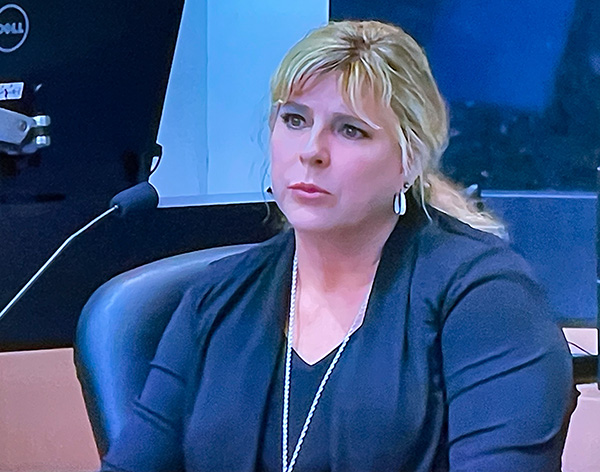
Dr. Shiela Rappa
Both Dr. Myers and Dr. Rappa agreed that in-patient treatment would have been best for RF, but Dr. Rappa said that according to the records she saw, no one ever recommended that to Mr. and Mrs. Ferriter. The doctor said that children with RAD often keep misbehaving even if they know they will be punished. “I do not think they were maliciously trying to harm their child and make things worse,” she said.
In closing, defense attorney Prya Murad said, “We can sit here as experts and tell parents, this is the approach you can take, and in an ideal world, that would work. But we aren’t the ones going home with that child.” She added that Tim Ferriter had to make “tough choices.” She did not dispute that Mr. Ferriter’s actions harmed RF, but she reminded the jury that the case was about intent. She said Mr. Ferriter did not have criminal intent, and the jury could find him not guilty, even if it thought he made bad choices.
Recalling the video that showed Mr. Ferriter saying to his son, “I’m not giving up. I’m not quitting. You’ve got me forever,” Miss Murad said her client was determined to stick it out. He never initiated a “failed adoption proceeding” to hand the child over to the government for care.
Miss Murad reiterated that RF has little inhibition, self-control, or insight to his own behavior. His bad behavior was “ongoing and persistent.” She explained that the Ferriters controlled the lighting and air conditioning in RF’s room because he had “played with” lamps in a way that made them worry he could start a fire.
Miss Murad said the Ferriters put him in a private math and science school, hoping that an intellectually challenging environment would help him. They took him to track practice and chess club. Prescription medicines didn’t help. She said the disturbing Ring videos were of parents “at their wit’s end.”
The verdict
In his jury instructions, Judge Howard Coates explained, “It is not a crime for the parent to impose reasonable physical discipline on a child for misbehavior . . . even if physical injury resulted from the discipline.”
Judge Coates told the jury that the state had to prove beyond reasonable doubt that “Timothy Ferriter willfully tortured RF or maliciously punished RF and willfully or unlawfully caged RF.” “Malicious” meant that “the primary purpose of the acts was to cause the child unjustifiable pain or injury.”
The judge told the jury it could convict Mr. Ferriter of a lesser charge, “culpable negligence,” which was defined as “unintentionally but recklessly causing harm to another.”
After deliberating for four hours, the six-person jury (races unknown) found Tim Ferriter guilty of all charges: aggravated child abuse, false imprisonment, and neglect of a child. Mr. Ferriter had shown no emotion during the trial, and remained stoic. His wife crumpled, putting her head down and covering her face with her hands. She will go on trial next, though the date is not set. Mr. Deborzatti, the couple’s Australian friend, shook his head and mouthed “I can’t believe it.”

Tracy Ferriter
Mr. Ferriter’s lawyer asked that he be allowed to go home with a monitor until sentencing, since he had no criminal record and none of his children was home. Judge Coates denied the request and remanded Mr. Ferriter into custody after a final hug with his heartbroken wife.
Sentencing will be November 16. The minimum is 35 months, and the maximum is 40 years. Mr. Ferriter could have had 24 months in his plea deal. After the verdict, Prya Murad said her client turned down the plea deal because he would have had to testify against his wife and that Mrs. Ferriter would also have to accept a plea deal, though the terms were not disclosed. The state added the charge of aggravated child abuse after Mr. Ferriter refused the deal.
Tim Ferriter chose not to testify. I felt a lot of sympathy for RF as he described his life. Mr. Ferriter was expressionless throughout the trial, and testimony could have humanized him. However, it is always risky for defendants to take the stand.
Asked why he did not testify, Miss Murad said, “It’s the government’s job to prove their case beyond a reasonable doubt. . . . So, we made a decision based on our belief, at that time, that the evidence that the state presented was not sufficient.” She will appeal, saying there was evidence that the jury was not allowed to hear.
For example, RF had been removed from the Ferriter home and put in foster care, but his bad behavior continued. A prosecution expert had testified that if RF were removed from the Ferriter home, his behavior would improve. She also said that she had been barred from putting on evidence that Mr. Ferriter had sought psychological help for the boy. She could not mention at trial that RF had been interested in watching videos of people being hit by trains, for instance, or that he deliberately rode his bike into the family’s dog.
“I think it is a failure of the system that we are unfortunately here today,” she said, “and I don’t think that Tim Ferriter being in custody or going to prison solves any of that.”
Nellie King, another lawyer defending Mr. Ferriter, wrote about more of the evidence that was excluded: “longstanding dangerous and disturbing propensities [the boy] has exhibited in multiple schools, neighborhoods, and homes towards other children and adults over the course of a number of years.”
Miss King worried about the safety of other minor children who might be living with RF in foster care, writing that “his behaviors and manipulation will not end with” removal from the Ferriter home. She wrote that RF’s siblings’ safety “has been jeopardized by [the boy’s] attacks, a number of which have resulted in serious injury.”
Miss King’s letter mentioned many things RF did but that the defense was barred from mentioning: He pushed one of his sisters so hard it fractured her shoulder. He tortured animals and took knives to school. He stole from schools and classmates and from the church collection plate. He fantasized about killing people and searched the internet for ways girls had died.
With RF’s long history of alarming behavior, Mr. and Mrs. Ferriter worried that he could get worse and they could be liable if he hurt someone. Tim Ferriter’s “guilty” verdict hinged on the word “reasonable punishment” but perhaps if the jury knew the whole story, they would have understood why it seemed “reasonable” to lock RF in his room. That bad decision may have come from a desire to protect the other children.
Neither Mr. nor Mrs. Ferriter testified, so I don’t know why they adopted RF, but there is no reason to think they were sadists who adopted him to torture him. I couldn’t help thinking that if not for the pathological altruism to which many whites are prone, Tim Ferriter would never have become a criminal. If he had not adopted from overseas, he probably would not have had to rear a child with RAD.
Did the Ferriters even know about the condition? The internet is filled with parent blogs explaining how difficult it is to raise a child with the disorder. One parent writes:
There is a myth that proper parenting will change the child’s behavior. RAD results from trauma that impacts the development and physiology of the brain. No one would go to a child’s oncology ward and tell the parents that if they just did a better job, their child would not have this condition. Yet, this is the message I hear all the time. It is cruel.
According to the Adoptive Families Network, most adoptions that fail are because “the child has reactive attachment disorder so severe that it doesn’t respond to therapy.” Mr. Ferriter was determined to “not give up” on his son. Now, he won’t be able to rear his biological children, and they are living apart from each other and from their mother. White Americans must understand that their foremost duty is to have white children and put their own families first.















